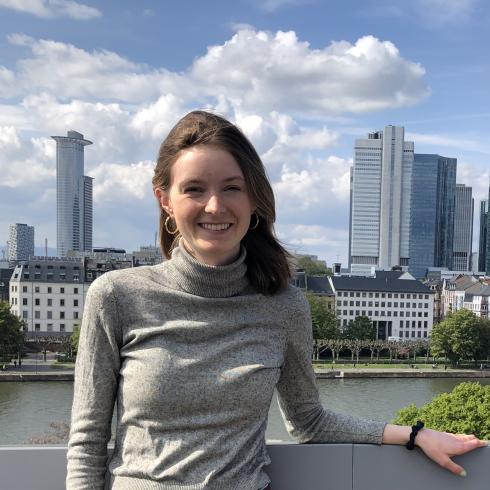I recently had a conversation with a friend about host families, roommates, and the concept of being “lucky.” This friend, who has recently been diagnosed with celiac disease, is spending the spring semester in another country, where they are navigating both a new language and new challenges to their health.
“I am really lucky,” they said, “my host family is accommodating and kind. I could have landed anywhere, and I’ve landed somewhere welcoming and supportive.”
“You might be lucky,” I said, “but you are also diligent. You’ve put effort into cultivating this relationship. Not everyone has this skill.”
“Maybe,” they said, considering. “But it’s not like I have a choice. Either I engage with my hosts and articulate what is and isn’t safe, or I eat gluten and feel ill.”
This friend of mine is right, of course. Some students get “lucky” with their hosts (in my case: roommates), some do not. But I also firmly believe that it is the effort we, the “guests” put into cultivating these relationships that determines the experience we will have.
I am “lucky” to have landed among wonderful roommates in my WG here in Freiburg. But I feel equally qualified to acknowledge that I have put effort into the relationships I have formed in the past two months. They are easier, stronger, more enduring, because I have put the work in on my end to make them so.
Today’s topic is exactly this, the question we all ask ourselves, consciously or otherwise, at some point over the course of our time abroad: “How do I become not just a visitor, but a member of the community in my host country?” I’ve assembled a list of six tips which have helped me improve by leaps and bounds both my language skills and my sense of community here in Germany.
(1) Cultivate trust among roommates (or hosts) and communicate in target language
I can’t recommend this one enough. One of the first things I said after meeting my roommates was that I did not want to speak a word of English while I was living with them. “I am here to practice German,” I said firmly. “I am certain you speak English very well, but I want to take every opportunity I can get to speak German while I am here.” This is especially important for Germany, because everyone is taught to speak English in school and speaks English very well. I have spoken with students in my program who have thus created a habit of speaking English with their roommates. The fact that they report feeling less comfortable in their apartment no doubt correlates to this habit. My roommates have been very patient, very accommodating, and very enthusiastic about helping me improve my language skills. We engage in conversation, and as a result: I am not just a spot on the periphery, but a member of the WG family.
(2) Attend International Student Events
I touched on this briefly in my last post, but it is important enough that I am including it here too. I have made a number of lasting friendships outside of my program with international students all over the world. One, by chance I met at a symphony concert. We exchanged contact information and now bump into each other at least once a week. I also have a wonderful new reason to travel to Spain someday, and she has a place to stay in the US. I made another friend at an international student party at the mensa (student cafeteria). We had one of those equally awkward and affirming experiences where each thought the other was a native German speaker. Now, we make an effort to reach out to one another when there are cultural events, university happenings, new exhibitions or other interesting gatherings. And, as this new friend has been in Freiburg now for a semester already, I am happy to have a recourse to ask any question under the sun related to university life in Freiburg.
(3) Be ruthless about language
Language Students: you are here to gain the priceless experience of bilingualism. Don’t let this opportunity pass. Here are my top pieces of advice:
Enroll in university classes: if you are considering it, you are good enough. Challenge is the best catalyst for growth.
Be ruthless about language; endeavor to speak only target language among other program students. Certainly, there is nothing like practicing with native speakers, but I’ve found that speaking with classmates, especially those more adept at the language than I, provides a comfortable entryway into the “real” world.
Meet with a language partner. Your local international student association or teaching-language institute will likely offer opportunities for English speaking students to practice their target language with a student learning English. This is a great way to establish a routine, practice your target language and expand your perspective of our own language, and make a new friend along the way.
Non-language students:
Continue (optional) courses after the required intensive phase: won’t it be fun to return home after a semester in a new country and impress your friends with your new skills? Moreover, while you are in your host country you will feel more comfortable carrying on basic conversation and, as a result, you will gain a valuable awareness of your surroundings.
Rather than asking whether a barista “speaks English” (or plowing ahead in English without throwing in a “sprechen Sie English” or whatever it might be), use your coffee as an opportunity to practice your new skills.
(4) Avoid traveling far during the first few months
I am prepared to be ridiculed for this one. I can take it. The fact is—it’s hard to establish a foothold in a new place, even after six months of living there. Don’t pressure yourself to leave it then. Explore your area! Hop on a bike, take a walk, ride the tram to the other side of town. Take day trips. Take a new route home. Look out the window.
(5) Know your passions, and engage in these while abroad
What can’t you live without? Basketball? Running? Knitting? Reading? Ask around, look for posters. Follow your local Instagram profiles. I guarantee you will find that thing—perhaps in a form you have never tried before, but you will feel good doing it.
Keep your eyes open for local/cultural events that align with your interests. If you love classical music, check the student ticket price for the local string groups. Literature—look and see if your city has a literature house or a vibrant library scene. If your goal is to try every bar in your city before you leave, inquire if they have music nights, comedy or open mic. Public posters are an excellent way to pick up on local events. Check tramlines, train stations, the university library, your IES center.
(6) Apply for an Internship
I will no doubt have more to say about this when I have started my own internship later this summer. I will, however, offer this: the process of finding my internship is affirming and not nearly as imposter syndrome-inducing as you might think. The program directors at IES are indispensable resources. Don’t hesitate to use them, ask questions, articulate your interests and, ultimately, reach out to your prospective internship. There is no better way to practice your professional language skills than in one that you have chosen and earned for yourself.
~
Today is the 26th of April, which means I have been living in Freiburg now for exactly two months. I say “living,” because I know longer feel like a visitor. I have so much to learn, so many more corners of the city to explore; I feel endlessly lucky to have this opportunity (what an immense privilege it is!) but I acknowledge the work I have put in to gain the most from this experience.
I’ve already written far too much. For those of you who’ve stuck with me this far, cheers, I’m impressed, and I’m almost done. I’ll leave you with this last piece of advice: embrace aloneness. Don’t be afraid to step outside of your program bubble. You will always have this network to support you, and a cozy center to return to.
Alright that’s it, I swear.
Until next time, <3 C

Carolina Weatherall
I like telling stories and writing long-winded essays about my cultural observations. I generally wind up where there are books, or people talking about them, or—better yet—people celebrating queer, feminist or minoritized voices in twenty-first literature.





